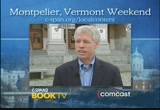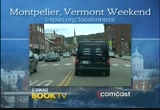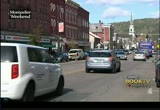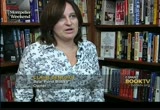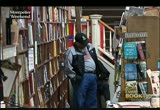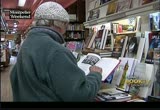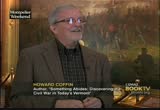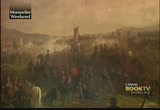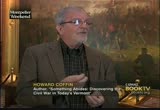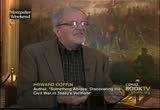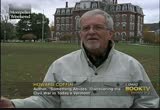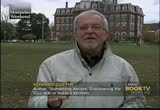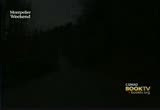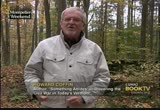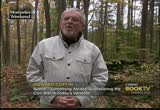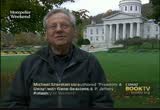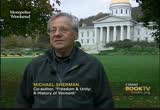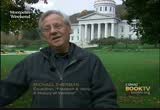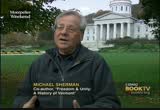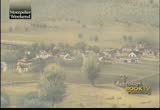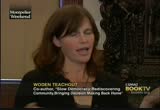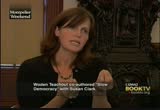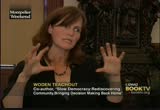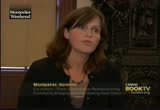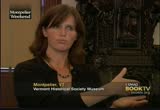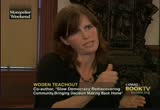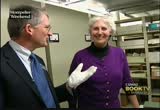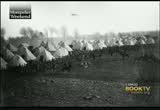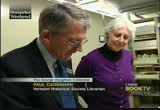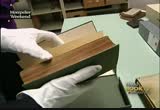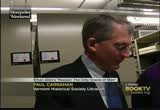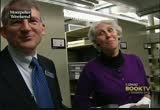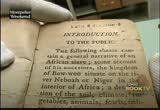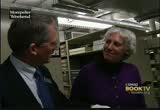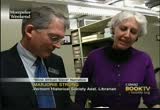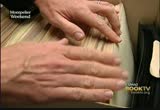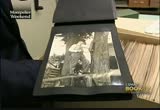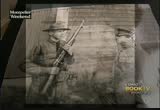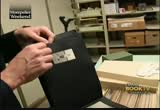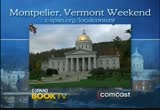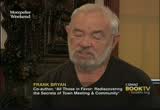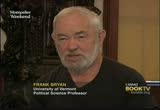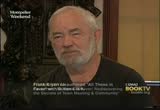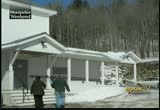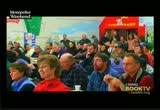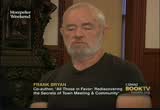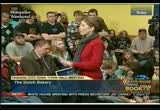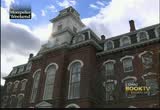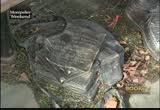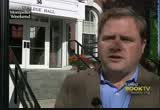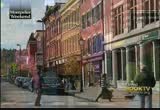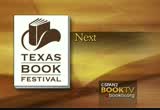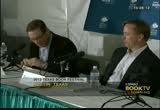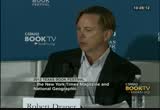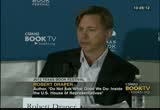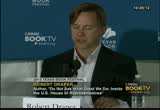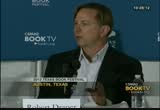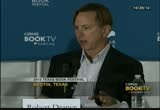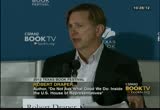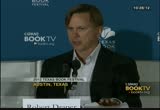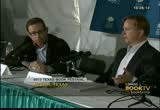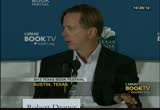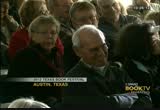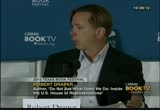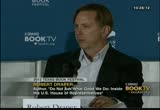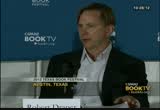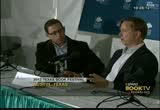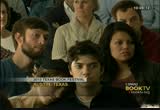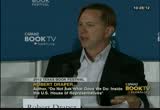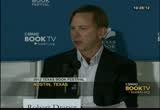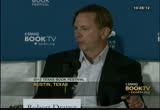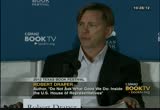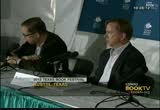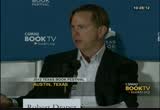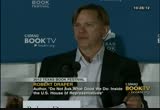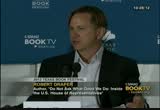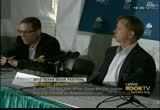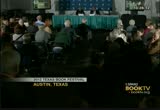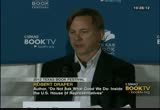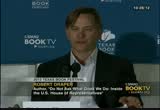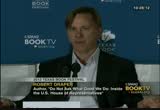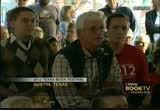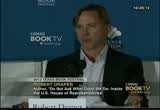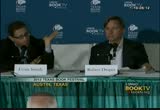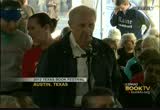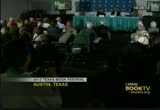tv Book TV CSPAN November 4, 2012 9:00am-11:00am EST
9:00 am
really eerie. >> i think there's a lot of things that are unique, it's the smallest state capital in america. in terms of vermont, the largest historic district in the states is a a very historic community. a ton of a thousand, we grow to about 20,000 during the day. that's largely because the jobs that are here, we are a center of commerce in the area. we are very fortunate here in that we are somewhat insulated from a lot of the trends that occur nationally. ..
9:01 am
montpelier really does value the independent nature. our three independent bookstores, we have a very significant out of here about the teen years ago. were the only state capital in the country that doesn't have comments and that was a choice. it's a testament to the community and citizens here. they banded together and made it clear that with not the kind of business we wanted and that would be the outcome. so there's a real sense of independence and a value other people people who've lived here. see that in the way people behave.
9:02 am
9:03 am
we have these great old wooden floors that make a ton of noise and our customers love it. it's a little bit lost on us why this is so wonderful because we listened to it all day long. it's the character. we're not a super slick kind of store and descriptive slurs represent that. it's a real old kind of story that she don't get a lot of communities anymore. were an independent bookstore since 1973 and i've owned the store since 2006 along with my house and. it is open by michael carson brca2 73 across the street and it's been part of the community ever since. visit the store after a flood in 1992 with the old sort have flooded it was time to expand and start in a fresh space, so we been here ever since.
9:04 am
it's really a community bookstore. people have been coming here since the beginning. kids have grown up here and we definitely like being part of the community that way. i don't think you can fine-tune a chance of a thousand people that support through bookstores. i won time we had five bucks to respond within a stones to serve each other. you don't find that too many places anymore. most independent bookstores are closing around the country. some may support more, but a lot of stories have been in business for almost 40 years i got are not surviving changes of ownership and retirements and things like that. but this is a community that values books, values reading. we have a lot of writers and as a community beyond not by his independent story. there's a lot of malls around here and it really makes a huge difference.
9:05 am
if barnes & noble had come into town 20 years ago, i don't know if it would still be here, but it didn't. the reporters and barnes & noble and other towns nearby at the community got long before the buy local and shop local movement started. this community understood if he wanted a bookstore, you have to shop at the bookstore, not go to barnes & noble and say that she loved the store, which i think is a problem. people definitely say they support the store is coming to when you purchase elsewhere come you're not really supporting a store. so the community has understood that from the beginning and people come in her other time to say about this book up online, but i want to buy from you. we hear that all day long every day. i looked it up on the internet, but i'm not going to buy it there. they make sure to tell us and we appreciate that. it's that attitude that keeps us
9:06 am
in business because if we didn't have that, wouldn't still be here. [inaudible] >> bear pond has always been involved in the community. from small thing that we service a ticket agent, everything from school plays to orchestra concerts, we sell tickets for. so we've become a supporter of the arts in that way, which also brings a lot of people and to talk to us. but were also on local boards and appalled at the local downtown organization and more involved with local schools and supporting activities they had there. some of it is monetary and some of it is helping out. we are definitely reliant on our community. the readers, the raiders, the people who support independent
9:07 am
stores. but there is a great rating community in vermont and in this area and we have the vermont college of fine arts right up the street that has writing programs for adults and children in creative writing. so customers come in the first place they go on a common is our best-seller table, which is right up front. at the independent booksellers list by mrs. -- not the same as "usa today" or "the new york times," although of course there's overlap. so people go straight there to the new releases table and then they go and it is not a good publisher, not a lot of publicity. so we definitely rely on local writers to keep things vibrant or interesting around here. to see a lot of local authors on our front table and we also work with a cup o. colleges who may
9:08 am
have seen professors and and they have resident reprograms that come in. it's very good writing, very powerful. a good number of our best sellers come right off of our staff pick table. each staff member has customers who always read what you suggest. you can't re-create that with an algorithm on mine. it's the same thing. it's talking to people and having someone say i loved it because -- i think you're going to love it because of this. you can't get that other places. i think the challenge to owning an independent bookstore these days is definitely competition from the internet, both from online darker place in the whole e-book, even reader phenomenon that is very popular and definitely affects us.
9:09 am
a lot of our regular customers, like i said, they love us, they support us, but then they're like i got this note, or is so easy to get a book. staffer lost customers that way. a lot of people will buy e-books from us through our website, which we've enabled. but not everybody does and we've lost customers that way. we don't loose customers so much as they don't buy as much as they used to. we see a lot of people whose purchases aren't as high as they used to. it's a con to question the power we going to survive in this new environment? publishing is in a precarious position and a lot of bookstores and how are we going to survive that? is something we think about all the time. there's no resting on your laurels, even if you've been here almost 40 years. we are constantly trying to change and adapt and stay on top of things like adding e-books to
9:10 am
our website and having a website that you can order any kind of book on, something we work all the time, on facebook, we need to bring in new products all the time. we have more things that are nonbook items in this or that people enjoy for giftgiving that we pay careful attention to. would definitely have to stay on top of things and make sure we are checking with the next place we should be going and not just assuming they will keep coming. and it is very important to keep the bookstores because we are you going to browse if bookstores close? box stores are going away to some extent certain of her books are you going to browse? really good ideas? i personally do not want him to sign controlling the industry. without independent bookstores, that's the powerhouse. they are not the people. i don't think we want to make in
9:11 am
the decision work is published in markets advertises. i see that as a big threat. if you want an independent bookstore, you have to shop at the independent bookstore in your community. i might not stay what you find something convenient. you can have an algorithm to you what to read max, but that is not compared to corn in the store, browsing, finding something unexpected and finding something new but i feel a favorite author you didn't know about, coming into a story that feels natural and grew organically and had the personal feel of the people who work here. >> we hear from howard coffin, author of "something abides: discovering the civil war in today's vermont." mr. coffin talks about vermont's
9:12 am
role in the civil war. we visited several historical war sites visited in his new book. >> i am howard coffin, a seventh generation vermonter and i have at have at lease six ancestors who fought with vermont regiments of the civil war and i've written three books on vermont and the civil war and the fourth one will be coming out in the spring called "something abides." it comes from a famous speech by greek hero, joshua lawrence chamberlain, a hero of gettysburg. he said on grape battlefields something abides, something remains. you can feel. i know vermont as to preserve our rural landscape is the best place to see the america of the civil war era.
9:13 am
and so i thought were going to go to everyone over 251 towns and see what survives civil war site i can find. underground railroad site, i even found a field or a quaker minister predicted the american civil war. these places are everywhere. it took me six years. the book is finally done and will be out in the spring. my new book has identified about 3500 civil war site in vermont. if i had to pick one against all the others, it would be the vermont state house when the civil war began in 1861, the governor of vermont called the legislature into an extra
9:14 am
session, a special session. he had received a telegram from abraham lincoln inquiring what vermont might be expected to do in fairbanks and a good vermont sentence replied, vermont will do his full duty. governor fairbanks addressed the legislature when he arrived here. he asked them to appropriate the astonishing sum of a half-million dollars in this little say. a legislature deliberated for about a day and appropriated $4 million. that even made news in europe. the painting behind me is painted by julian scott do it then a charmer boy and had dropped his charm and waded into a creek to rescue wounded vermonters. and for that, she won the medal
9:15 am
of honor. so when the legislature after the were decided a memorial painting what to julian scott and he visited the battlefield kansas city pitcher rain and was absolutely accurate. i've been there 50 times. and produced this wonderful painting that not only accurately predicts the battle amateur rain, but painted about for departures of vermont soldiers in the battlefield. the military role as an outsized one that i'm absolutely convinced of that based on a relatively small 350,000 people. burma's performance was extraordinary. we may have saved grant's army and the wilderness. at the battle of cedar creek will treat behind me. i'm not sure the union would've
9:16 am
been victorious without the vermonters. they stopped the great surprise attack on october 9, 1964. it's a counterattack that won the battle and gain control of the shenandoah valley for the rest of the civil war and made certain abraham lincoln be reelected. very many incidents in the war paper on april 2nd, 1865, after nine months of crying can you listen to the screams break the minds of the brigade leaves the attack and finally smashes through the sense is and robert e. lee surrenders at the appomattox courthouse. i came away with it deeper realization then after that the civil war effect did everybody in this state.
9:17 am
we sent 34,238 men out to battle. that's a tremendous number. one and nine of all of our citizens. back here at home, the burdens that fell upon the women, the old men, the children who run the farm, to run the fact areas and at night or on the weekend makes things for the soldiers to cook things, to put in talks is done by trained. they never stopped working back here. and then of course the soldiers came home wounded, sick, the burdens for caring for them sell on the same pew all. the home from performance vermont and the civil war was extraordinary and i never knew the decibel. the civil war really began for vermont in this building a mile away up on top of that hope the
9:18 am
results first hand became very obvious to vermonters because that there was a 600 at hospital, where civil war sick and wounded came home to be treated. we are on a hilltop city of montpelier on the campus of vermont college and this was once a montpelier phil graham. once the civil war began, it became a trail field in the sixth of vermont regiment formed here. almost a thousand men and they strolled for about three weeks before they marched down the hills of the rivets stationed at the statehouse in my mouth for war. it's burton in the book, but more importantly in 1862, and that then governor of vermont went to the federal government and said we think we can cure our sick and wounded soldiers if
9:19 am
you'll send them to us in vermont with loved ones and the clear air complete will heal them. after long bureaucratic fight he got permission to open three hospitals here in vermont. one of them stood right here at the center was in the middle of the field and his long wings extended from the century. they could treat about 600 soldiers here at once. brought here to run the hospital with a man named henry james from nearby waterbury with benetton talk dirt and water. and i must than the civil war and was a great most of the rank of major. after the battle of gettysburg, the war department sent into gettysburg and put them in charge of all of the 25,000 wounded at gettysburg. he did a magnificent job. when i was finished, he came here to run this hospital.
9:20 am
before he left gettysburg, he was afforded a great honor for his performance and he was allowed to sit on the speaker's platform the day that lincoln gave the gettysburg address. share this hospital, during the worst days of the civil war, the campaign of 1864, the trains coming north to vermont filled with sick and wounded, this hospital is running out full capacity. but the cure rates were astonishingly good. holbrooke was good. the whole treatment were and many, many vermonters lived on because of this hospital here and did a wonderful job. it is only one building that still stands in its original position and give us a card house. after the war, the long wings were chalked up into short sections and folders houses.
9:21 am
and all around this neighborhood are houses that looked just about identical and you can identify them as part of field hospital. there's about 500 civil war sites in my book. almost all of them have no historic marker to identify them. say you are going to need some thing to find these places. but when you get there come, you may be amazed. we are in the hills of ireland, vermont, which is a town just south of montpelier at a cellar hole of a farmhouse that long since fell down. but back here in the 1820s and 30s, two young men grew up, two brothers who had served in the civil war. richard crandall, the older
9:22 am
brother, went from here to dartmouth college and then enlisted the six vermont regiment and became a combat officer. his younger brother, john crandall became a doctor when the civil war begins, she enlists the 16th for my regiment and that's one of the regiment to pickett's charge. after the battle, he takes care of the vermont wounded on the battlefield. at the war he's a man of the venture and goes west enjoyed george armstrong, custer said calvary. race wonderful letters about the plane indicates that while before little big horn. his brother in the civil war, richard, was in the major fighting in the east and he survives, comes home in 1864. a friend of his from dartmouth
9:23 am
goes to the top of one of our high mountain and camps out overnight and they talk about a war. crandall remarks that to have seen the six core at the battle of fredericksburg was a lifetime experience. he goes back to war with the vermont arcade in the overland campaign. he survived the great battle and then a whole herber he survives the big attack. but on the seventh day of june june 1864, a sharpshooter from long-distance kills him that and his body is brought back here to berlin. we are here because this is a civil war site. this is where two young men grew a, who went off to war and
9:24 am
played important roles in the war. we are here because i was able to identify the cellar hole has been their home, although it's a difficult search because the family did not own the home. they were renters or farmers who were difficult to find and record. finally, census records led me to this place. i want people to know whether they came from this remote places in vermont to go to these places if suddenly became the most famous among the world, gettysburg cold harbor. going from these little towns found these little roads, finding them 80 stream of vermont soldiers that had such an ordinance act on the outcome of the civil war. next, we're going to the church come were major crandall's
9:25 am
funeral talk about the poem he wrote just before the fighting began in 1864, a poem that seems to have predicted. the crandall family went to church here. when richard went back to the army for the last time commuters in the overland came came a nice i said he survived his battles at wilton and spotsylvania only to file a cold harbor. one of the last entries in his diary was written in the trenches. skirmishing all day on our friend, the evening is raining. the first is across the river. the band is playing the memories that weekends. and on the seventh of june he felt a sharpshooter's bullet. the body came home to dinner with station in montpelier and it allowed hill to this church for the funeral.
9:26 am
the civil war is a complex story. there's still much left to be discovered. it's out there if you're going of that and put this book you can find the history of estate they did when the civil war and the story is set in a beautiful landscape that is most like the civil war landscape of any state income falls.
9:27 am
>> the book is titled "freedom & unity: a history of vernmont." the authors are me, michael sherman and gene sessions and jeffrey chavez. we work on it together. we thought of it as a comprehensive history of vermont . it starts with the formation of the mountains and it goes to make additions to it right before we published in 2004. so it's got a lot of information about people, politics, social movements, intellectual movements. literature, some of the er. we tried to touch on many of the topics without vermonters wanted to know about and people might want to know about vermonters. there have not been a single history of vermont written since
9:28 am
the 1820s with a big four by history came out. there have been a few other shorter pieces and popular pieces, that no single writing which is a comprehensive history. as i was leaving the vermont historical society, the opportunity came up to pick up this project, which had been abandoned because of his 15, 20 years old and nothing had happened. the trustees asked me if i would work on a new history of vermont. i agreed to do it with cooperation of my two colleagues because it didn't seem that to the very project for one person to take on. and we were done it. i worked on for eight years, each of them worked on it for four years and we produced this monster of a 700 page work, which i think surprised
9:29 am
everybody, us included. vermont, 700 pages? you've got to be kidding. a couple of the reviews actually said that. why such a big book? if you set the first response aside, it's been a very sensible book and very satisfying. when we brought it out, we are surprised by the size of the hit without this'll be a door stopper people will use it to exercise in the morning. but in fact, people have friday. not necessarily start to finish. they dip into it in places where they have particular interest and we hear from people. people write letters to wes' authors say and i just got the book and i really like it. that's always very nice to hear. when we start at the beginning,
9:30 am
eventually way back in the beginning, billions of years ago because the mountains are so important as part of not just the geography and topography of the place, which is obvious, but also because of the history of the state from the very beginning. so we ended up doing the geology and started with the formation of the mountains, how they got here. and then continued on. but beamish decides on some some chronological breaking point. and not being strict about it, but say it will take mountains up to the time the french arrived. and then the french need to statehood. figured out the big, important breaking points were chronologically found that we could work on. this became our chap there is. the state motto presented for us a puzzle.
9:31 am
what did it mean for the people who adopted the motto, the motto in 1778? what does it mean in 2012? we really tried to address the question about individual freedom and the accordance of individual freedom and ours take and is always in our institution. but the obligations and responsibility and benefit of association with the state government and with the nation. so we are one state in the nation. vermonters came here not as part of a colonial very much. i mean, the first permanent white settlers came after the french and indian war, the french have been here before, but they left. in 1763 into the early part of an 18th century war in 1810,
9:32 am
1812, there was an enormous influx of people from other press of new england into vermont. vermont was not one of the colonies. it was a state created out of new york and new hampshire and they fought over it and actually the state making part of vermont has its reflection in our u.s. constitution. the article and the clause talks about how states will be made in the constitution. was really a result of the constitution new york had with new hampshire and vermont about who is going to own it and how was vermont going to be a separate state? so we had that influence sunday from the constitution making of our country. so the cover image is a detail of painting, a few of 1875 by frank child. the reason we put it on the cover, if you look at the whole of it, you see it's got everything about vermont you need to know.
9:33 am
it's got mountains, fields, cows, it's got a bad road, it's got an industry building there. it's got little houses, a church, a meeting house. in a sense, it's a microcosmic view of what the state is about and the tension between those. the mountains have been not only geographic figure, but marvel comes out of it. it's been an economic resource. it's an agricultural state. we have had industry here from early on not as big as elsewhere, but everything going on in the state somehow captures in this painting. though it became a perfect image for what we're trying to accomplish in the book by showing a variety of vermont. vermont is not just went in. not just cows or sheep as it used to be. people don't think we've had an industrial history, but without an industrial industrial
9:34 am
history. here is the river that connected us to the east, connect this to the west and played an important part of the development of it. some of those things that in a way carrot to rise, but may surprise people about vermont are captured in this one marvelous painting. >> low democracy takes a space from a frame of and which began in rome and has really evolved into a whole idea, which is very strong and vermont. local people say it's crazy. the way our food system is set up, by reprinting and tomatoes
9:35 am
from 3000 miles away? you get them here and they taste like cardboard. that doesn't make any sense. we have capacity in our own community to foster arms and to develop relationships between farmers and eaters, which is all abuzz and have a very vital, likely food system. and so, we took that slough and thought wow, what are the insights we can take from slow food and apply toward democratic structures because right now from washington is like the faraway farm that is generating these laws and the tomatoes that taste like cardboard is in a lot of mandates that, down from washington. it's truly vital and self-government. in vermont with some examples of how individuals in towns and counties have been able to do all kinds of really exciting work on the local level. so i thought local, and this is where the action is and they
9:36 am
still think it's incredibly important. what i learned in the course of the book was the importance of dialogue and deliberation and that did not come easily for me. i'm someone who likes action. i don't like meetings. i don't like sitting there. i think when can i get home? i was not as convinced of is so important for us to get together and have conversation and share a casserole or some name like that, but working this season and see the example, talking about the examples of communities and action really convinced me, particularly portsmouth, new hampshire. they were the good middle of a bitter, bitter school redistricting fight in their community and the superrich elementary school busting out at the seams and to poor ones that releasing students and obviously the answer was to move to one to the two other ones.
9:37 am
but they went through this whole process to create study circles of people from both communities could come together and talk to each other and realize what goals they had in common. at the end of the day they came out with a specific plan that involved moving a small number of students from the bursting school to the smaller one. school politics is some of the bitterness. people really but head-to-head. so for them to able to do that and to take these possibilities that weren't there in the national conversation. the national conversation you are either for or against. what they were able to do through study circles is to develop practical, on the ground solutions to problems that would not have been possible if they were together and talking about these issues. what we do in this book is basic just three basic principles for
9:38 am
any slow democratic process. so this might apply to small meetings, budgets, that this process need to be inclusive. they need to bring up front to the table. they need to be deliberative so it's not just voting for an up or down situation. it has to be people discussing basic ideas and how to get problem-solving. the third of all, they have to be empowered. at the end of the day if you're not allowed to impact your government. visit three elements is identified. there are many, many different forms of processes that can fulfill all of the elements. one of my favorite examples is a cannot chicago community policing and they wouldn't necessarily think of themselves because they were developing processes without that framework. in the early 90s, chicago had this terrible, terrible relationship between the police department in the dissent.
9:39 am
and so they said how can we prove it? to begin holding monthly meetings and inviting both police officers and community members. they sit there and say okay, what are the challenges in this particular district? what are the police is challenges and resident? in one particular community than are set at chicago, there was a park called gil part and it was overgrown nevada shrubbery and is a big drug dealing center. dealers would go when and hang out in the shrubbery and then there were a drive-by shootings associated. the residents came and said we can't live with this. what are they going to do? together with the police, using the police know how, they were able to identify here are the conditions that are allowing these drug dealers to be here. they have this cover. there's no police.
9:40 am
the police and citizens when in every landscaper park. the police committed to doing walk-throughs of the part and residents who lived in the housing projects committed to calling him when they saw suspicious activity of the park. so as a result, crime and a park dropped and so that's a great example of something that would've never happened if you didn't involve the community and police officers talking together. i co-opt their premises and click of the dialogue and deliberation expert. she knows about different democratic processes. she is the town moderator for a town meeting in middlesex, so she was able to draw on her network of all the different exciting things happening in dialogue and deliberation. she was able to put out all kinds of connections they are and get really exciting examples
9:41 am
of what's happening in local democracy. i'm an historian, so what i was able to do was to show how the public rss has really stand out over the last two centuries. when he came he saw lively towns and everyone engaged in the democratic process. they are all weighing in. gradually over the course of the 20th century and up till now, we have this process for democratic development is casting a ballot or pressing a button. so once we understand that what we think of as democracy is not what the founders were envisioning the people at the new super much history of the country, that forces us to really look at what we mean by democracy and how to get it back. what slow democracy does is it alters the way everything in a set of principles so people can find their own processes that work for themselves and their
9:42 am
own community. and from what we've town meetings that went incredibly well here. there are other traditions that people can build on. if they can look and say okay, in order to be a valuable vocal democratic process, something needs to be deliberative and needs to be powered. that provides enough of a framework for people to say, look, here's how we do it in our area. we don't have to have town meetings and apples. we can of oranges in some other process in california to people can take the inspiration and use it from wherever they are to the democratic possibility rises up locally and hopefully i think in some ways that can have an impact on the national conversation.
9:43 am
>> here we go. >> and 73 from the historical society. if a sub for a librarian and were in the vault of history center in vermont. we've got a photo album created by george houghton, a vermonter who went down to view and take pictures of burbach troops are in civil war. he presented this album to us in 1863 after he returned from his third trip to virginia, taking
9:44 am
pictures mostly of vermonters that camp, but also other scenes that he saw. one of the scenes that often reproduced as this one of a family of slaves again tieless. right below it is a photograph of soffa vermont officers. >> some of the other pictures showed been batteries they were using that were involved in this. there are photos here show in the aftermath at the burial ground of the soldiers. those photos get used a lot. there's a battery cresting ibm down there. leaves mills, which is one of the battle for to place. there's a wonderful photo.
9:45 am
people will potentially recognize because he used it on the cover of this book for the civil war. this sort of shows them all lined up in the full flush of glory, waiting to basically take on the south. a >> what the american flag fluttering above them, that adds to the atmosphere as well. here's another image that shows what camp life looked like. that one is actually warfarin shows. the one below it there, camp of the 13th shows how they had to cut down trees to create their camps. >> yeah, we want great letter were one of the soldiers as we camped in a cloverfield. is this now the only hope we can found this growing in the corner of my tent and a reduced this whole field into mud. >> first of all, these are
9:46 am
original photographs. these were the prince hotel and created a bottle bureau. so it's merely a one-of-a-kind item. the second reason is the vermont historical society, then it from a photographer who went down to the civil war and recorded it this way. and third, i guess because it shows what vermonters were doing, vermont is very proud of that civil war heritage in this document a portion of that. it mostly shows can't live, but it shows the names we are not familiar with a significant vermonters who participated. >> she was also affiliated. this is the same school of photography going on and was a very new school. they've never done this before.
9:47 am
taking pictures on site was totally narrow. the >> they were mostly taken photographs in the studio. there are lots of studio portraits of civil war soldiers floating around all the time. the photographs taken in the field are much more unusual. speaking of the early period, we have here a book by our revolutionary war hero, ethan allen. this volume is called reason, the only oracle of man and hits dus trash. ethan allen was in addition to sort of a frontier hunter, blacksmith, revolutionary. he also envisioned himself as an enlightened philosopher,
9:48 am
although he didn't have any formal schooling. this book he published in 1784 in paddington, which was one of the largest towns in the state of vermont. and he plays his religious philosophy that the deity can be ascertained through nature and one does not need established religion. he was very much an antiestablishment type of person, both in his politics and in his religion. this is a very rare volume. i'm not sure how many there are. the >> supposedly there were 34. what happened was he published it. he was in the warehouse that was struck relating to earn and of
9:49 am
course everyone said okay, that was because god was fighting him. so i think 34 copies were supposed to survive. i don't know how many survived from that smallbatch. there are some around, but it is a very rare book to get in this particular edition. >> in this book we've conserved and clean the pages. it's in very good condition. of course we did not touch the marks of the previous ownership. samuel provost, probably the same about previous owner. we put it in a modest fighting, not if fancy binding. it may not have even been bound at all. >> is an iconic figure to us. we think of ethan allen and the green mountain boys and their struggles for independence really from new york. you know, we were just
9:50 am
talking -- we tend to forget there was other people working with them, but he has become the icon for vermont independence movement. >> is a very loose just figure, and stature. he of course loved the green mountain boys at the taking of four to conder roca. he surprised the british. he was able to do it without firing a shot. he was rambunctious. so he has all these traits that make them stand out from the other revolutionary heroes who do great things, but he definitely stands head and shoulders above the others of popular imagination in history. >> is probably one of the best-known vermonters really i think even nationally.
9:51 am
people assist you very much. [inaudible] >> exactly. however mythological some of the stories are. >> i just picked up the african slaves. this is an interesting little book does kind of forgotten until the recent scholar picked up on it. and he was having a difficult time even getting a hold of it. but she discovered this -- >> she being kerry winters. >> she discovered this book than our collection is classified as fiction. she and her studies realized this is a very early and significant slave narrative.
9:52 am
>> and was told to a gentleman listed here in the title page as the author, his writing in saint albans, on lake champlain in august of 1810. he evidently befriended the slave who had a romney, the easiest one of which is jeffrey brace. he was also known -- >> bridge. he was a slave in connecticut and people forget new england had slavery as well. one of his fellow -- he was in a slave, but someone he knew there was matthew lyon who became a well-known figure. >> a vermont senator. >> he became a senator again.
9:53 am
>> there may be only a couple of the done that. but anyway, getting back to jeffrey. >> he actually thought the french indian war and in the revolutionary war. during the revolutionary war he was promised his freedom if he thought. so he began moving north because vermont at that time in this constitution title eliminated slavery. you have to be careful, but vermont had eliminated that is so he thought of as a safe place to me with his family. he moved into southern vermont, ran into difficulty because yes, there was no slavery here, but people are still fairly prejudiced until lakhs were unable to raise children correctly. they spent a lot of time trying to take his children away. he kept looking north until he got to georgia, vermont, and
9:54 am
that is where he settled. he became a friend of his lawyer so this is the story of the saga of his life. >> here's a representative example. he writes the next spring i said to one of my neighbors, if corum pulled down masons and destroyed my crops, i should be tempted to burn his arms. for this i was arrested and tried by two justices who unfair and full examination of the matter honorably acquitted me. so i links, corum swore he would be and when i went up to them in order to take it, you would run away and thereby save me from a good drubbing. we had each of those an excellent. he guided the word. >> soviets and struggles some struggles with his neighbors,
9:55 am
which is interesting because one of the most significant things about the book was when he was captured during the slave trade, he was actually older than many children. she was a teenager, so he remembered africa and in his book he describes his life in africa and his life here in america and that is actually a fairly unusual story that is not told very often. that is why scholars are so interested in this particular boat. the fun part is he did settle here. he stayed here, died here and he and his wife and children remained here and there is still graces in saint albans area today. >> although many didn't know their family history until terry winters dug into the story. many had intermarried and were not visibly african-american in
9:56 am
origin. let's get the album by grace coolidge that documents the coolidge family during the white house years and before. part of the coolidge family papers. one is just photographed and several boxes of other documents. photographs are heavy. and the album should be in the back of the box here. here it is. unfortunately, it is on black civic paper. there's not much we can do about it because we don't want to change the artifact nature of the album that sells. it's starting to crack. some of the pages are separating this is a photograph of calvin coolidge the day before he became president. he was in plymouth, vermont,
9:57 am
visiting his father, doing some chores. this is a press photographed permissively at the press along with them. you can see they took one photographs of him here with his suit jacket on and another one of them without the suit jacket on. coolidge was pretty well-versed at using the press to his vantage. the fact that he was from vermont was a hope in his political life and he used it. he visited planet several times when he was governor of massachusetts and later vice president and president. anyway, this is when he was doing chores and planet. the next day he would be president of the united states. warren g harding died unexpectedly. coolidge was sworn in in his father's living room by his father was a just to set the
9:58 am
peace. they later we administered the oath about this when he arrived back in washington. i like this album because it has in addition to the photographs by press people, it also has some family snapshot the net, some more informal pictures. this is a picture of one of the coolidge signs, john coolidge when he was doing military training at a camp in massachusetts. there is one here of his brother. there we go, calvin has spent the summer harvesting tobacco leaves in massachusetts. this is 1923. calvin would later tragically died in the white house.
9:59 am
he got an infection after playing tennis. we didn't have antibiotics that we have today he passed away in the white house. as a tragic event to the coolidge family might expect. some say it's the reason he didn't run for reelection. in 1928 he declared to choose not to run for the presidency and he dropped out of political life at the point. there is a picture here of happier days. the coolidge is as a young family lived in north team then, massachusetts. they rented a house, half of a house, a duplex. coolidge never on his own house until after he was president. there is young calvin. you can see it's not a particularly well organized
10:00 am
album. i think the photographs are put in here is grace coolidge decided she wanted to have them shown. here's a photograph of is looking for for, the informal photographs. this is the coolidge family or part of that at the white house. you can see someone has said something funny. president coolidge is laughing that whatever's going on there, sharing a nice family moment together. colin coolidge the president is known for being rather dour. alice roosevelt longworth said it looked like she'd been weaned on the pickle, but this photograph dispels that notion. he was also a very interesting person and had a sense of humor, too. ..
10:01 am
10:02 am
policy changes. it has nothing to do with recommendations are listening to people. it's to govern yourself and reach a decision. so you go into that town meeting in your tax rate is x and you come out and that's why. we bought a truck or decided not to. so that sends a message to the rest of the united states. you can govern locally. nationally it is almost a given that we can't, but you couldn't really do that. indeed you can. we do. a published susan clark, a book about town meetings, deliberation and reforms. all those in the paper, which was in the title. the force behind it. we're both were read that the
10:03 am
town meeting tradition is suffering and that we needed to write a popular book, readable book. it's an argument for a town meeting in citizens terms. the new england is really a cultural phenomenon. children grow up arguing about the next day bemoaning another citizen. it's all very real, so by the time you're in high school you know exactly what a town meeting is. pretty much how to behave. new englanders generally are pretty good at the liberation. i have found when newcomers come and i take them to a town meeting, lotions. one is often board of.
10:04 am
while. is this all there is? and it's true. others are always impressed. even scholars of delivered of democracy don't realize the extent to which this is not shouting and yelling and screaming. the best with think about it, the town itself is a legislative body. anyone living in the town is a legislator. they come to town meetings, at least once a year. so it's not representative democracy and all. no one represents you. you're the legislator. the sessions of congress and the house and senate, not everybody comes to a recession. we all come to a town hall which
10:05 am
your citizen, even though everybody knows your. it's really kind of fun. it's quite formal even though we sit down. there's an agenda. we can affect the citizens of legislators will affect that agenda if we want to. usually is will we call the selectmen, the select persons of the town which are the executive body of the town. they carry out laws. so we go through the agenda just like in the legislature would. the question is called. it's conducted under strict rules of order. it's now we see on television. there's no yelling out, no interrupting. if that happens people are called to account very, very quickly. so its own rules structured budget of session featuring, and
10:06 am
ordinary citizens like you and me. it takes a new way of looking a politics to really bring the left and right together. the right years big government, the left fears big business. what is the commonality? to pick. and if americans have that experience of saying how small works best in a democracy it will change everything. but of course in order to keep town meetings going you have to empower citizens. if all american citizens went to town meetings, lived in small towns will went to town meetings readily among the presidential elections of this year would be phenomenally better. we would not be sick of them already. there would be none of the unpleasantness and divisiveness. a think the fundamental challenge in the last almost a
10:07 am
hundred years, but certainly the last 50 is that the motors, like all americans, it on this centralization model. it just seems to be that we needed to centralize power, whether it's in washington or wherever. and so we did take away from the town's and it happened to lot of the ability to actually make decisions. and that's one of the great dangers. because people don't go to town meetings to see their neighbors in japan. dakota town meetings because they're interested in stake in want to govern themselves and make a decision. once you take that away and slowly but surely the attendance seemed to wane because it's just another kid together. the politicians that advertise their will hold a town hall meeting. which is what their will to,
10:08 am
hold a meeting of their supporters that they hope will tump , until the what to do. but that doesn't even come close. there just calling it a town meeting because they want to imply it's going to be a conversation. it's all going to be very nice like they did back in doing good so that's one case. and as the most egregious model. and the other is just a general reference to public hearings, a governmental public hearings. why do we insist on calling these meetings which are not town meetings, why do we insist on doing that? the national consciousness is linked to that tradition, and it's a dream we all have. we have in vermont.
10:09 am
common ordinary citizens collectively can deliver it these decisions that tent and matter on really important issues that affect their lives. the real, percy that began with the greeks and we'll argue about ever since does impact work in places and in fact can easily be transferred to other places in the united states it people have the wisdom of the will to do it. >> the nation's smallest state capital city with a population of about 8,000. it was named the capital of vermont in 18 of five for its relatively central location. book tv recently visited this city with help of our local cable -- local cable partner, comcast.
10:10 am
>> we are at historic vermont college of fine arts and montpelier, vermont. , novelist. i have always been a storyteller . i always loved to read. i was reading -- i can remember exactly. i went back to school and took a creative writing class. i have a knack for and a never turned back. nothing more satisfying them working on a novel, particularly when you have been jazzed up to of a job and a college because it's almost like in some ways of still a tanker at night in the rumors. no different than someone building model airplanes. and just crafting a model. the building behind this was actually erected in 1868. for years this was a women's
10:11 am
undergraduate college. in 2006 the campus was in danger of closing. there were established programs your. i lead an effort with faculty and staff of the college, take the institution independent. and in 2008 we became the first new independent college in vermont and a generation. what has happened since then has grown into a much larger vision of creating a national center for the arts. renowned for are writing programs, both of which are considered among the current. a graduate of the writing program. the place he associates with. what happens here, students come every six months and have we think of as a great gathering of writers, two, 300 riders a ton.
10:12 am
the stay here on campus, live in montpellier. they're and workshops to gather, lectures. when the not hear their work one-on-one with the faculty adviser on a novel. this program is the individual artists, you know, individual writers, and young musicians, designers, soon to be filmmakers. it's about the idea that there are people all of around this world who are working individually in their fields and weaving them together into a community. with their here they work together, you know, they're probably party too much together . at the end of it being a writer and an artist, a combination of intense solitude it takes to create the work about community is also important. that's what happens. people come together to our community. when i first moved here someone once told me they had to be careful driving around in the
10:13 am
back roads because you might hit a novelist. all over the roads like deer. there are just numbers of riders on or around here. up one. there was a literary map to show you where people lived. howard frank mosher is someone who comes to mind who really is in many ways the quintessential vermont columnist who writes about vermont. he's just a terrific writer. katherine paterson is on our board of trustees. national and pastor for children's literature, but some of her work in terebinth the which is a remarkable young adult novel. i think there is a real court anchor, one of those on literary cultures and places where people gather in the northeast part of the country. you probably have to go to brooklyn, new york to disclose. part of it is that people drawing inspiration from a
10:14 am
magnificent landscape we have around us. particularly for riders come on like a lot of places, we are web of small towns, front porch culture, not a backyard culture. you get to know your neighbors, rely on your neighbor's color have to work together to dependent each other. from that comes the hard of what makes good stories because you know people, so you know what happens in their lives. there are not many communities in america like that anymore sadly that both have the skilled moscow, size, and the kind of big sense of community and we're all in this together. we are a unique town in the we have independent bookstores. we have an independent college in the 1905 independent arts in the house. in magnificent library. i have a six year-old daughter and. the kids here, the library is the hub of the live. we grow leaders from the time they are little until they're
10:15 am
bigger. you know, we have all the cultural things you could have in a peace city in a town that really only has eight dozen people. and so that's extraordinary. a very unique. people mater, stories matter. institutions matter. the only reason to start a college is because you can do things, it takes of the people to do things you can't do it by yourself. and so, you know, a cable we're doing right now here on this campus is entirely unique. you have to go back to the 1930's and 40's to find a small place on the hillside as such control of it to the arabs. we bring in and top writers, musicians, designers. a year from now we'll start with film makers. this has become an essential the way for the larger culture. a very exciting and with its me
10:16 am
up every day and make you want to come to this old building in the third floor office. >> for more information on this and other cities visited c-span local content vehicles is it c-span.org / local content. >> no on book tv from the 17th annual texas book festival in austin, texas, robert draper it discusses his book title did not ask what could we do inside the u.s. house representatives. this is about 45 minutes. >> afternoon. i'm evan smith. i am pleased to be here with my. old buddy.in chi of th a veteran magazine writer and td author of his latest book is tot not ask what could we do inside the u.s. house ofine iter a representatives. robert is a familiar face arouni these parts, having spent presen immediately part of his careerra as one of texas monthly's marke
10:17 am
riders. the ear being a pair together again is kind of like dean martin and jerry lewis back on stage.ing at he is currently a contributingld writer to the new york timesstag magazine and national geographic and correspondent for gq his te previous books include that crre certainsp chemical it planned prior review george w. bush, ded comprehensive history of rolling biograph stone magazine and a novel.ng a native of houston who attende, the university of texas atal austin.ive o please join me in welcoming texa robert draper. [applause] >> nice to see. i thought we might start broad. are we better off than we were two years ago? we better off >> i really have to answer thata question [laughter] >> i really don't have to answer that question. >> you have to answer that question. >> is a need answering? >> it does. >> i think that the unit of measurement that democrats would use for the performance of congress is different from that was the republicans would use.
10:18 am
as the speaker has said over and over, the fact that we have passed a record low number of bills speaks well of this congress, the we are not imposing new regulations, not increasing taxes, and that is one way of looking at it. i think that the way, however, that most people get it attested to by its record low popularity approval rating is that this is a congress that has been defined by dysfunction and gridlock, a congress in which half a loaf has never been better than an and were compromises release seemed to be, you know, of foreign policy, meaning a policy for into the world's great deliberative body. >> do you actually think that the people iran in 2010 and got elected or for that matter the people iran before and have now ascended to positions believe that no is a solution or that they were elected to not do things as opposed to do things? >> well, again, from the class of 2010 and now i refer to the
10:19 am
87 freshmen, the so-called deep party class of the 100th of congress, i think their belief is that they are doing precisely what the people who elected them with some do which was several back all obama initiatives, to cut spending, a lot of them doubt that the debt ceiling should not be increased under any circumstances, and to that degree they feel like that was a failure. but, no, they basically believe that their job is first to obstruct barack obama and then once there is a republican president in place to pass those initiatives that create a better business climate, more and more deregulation, the funding of programs that have never quite been near and dear to them. yes. i think that they do believe. and, of course, after you flash toward a bit, i expect to will talks about the debt ceiling fiasco of 2011, but after that summer when we were taken to the brink of fiscal clef, we are about to see again, the thinking on the part of the house
10:20 am
republican leaders was, well, you know, maybe your tea party freshmen will go home, he yelled at by their constituents and realized in the you know, maybe compromise is not such a bad thing. the opposite occurred. they went home and the people who go to their town halls tend to be the activists of their party. most people tend to be tea party. there were the ones screaming saying, why did you exit the -- why did you accept the deal. so at best there have been mixed messages, and i think a great likelihood, it will be awhile before we see moderation. >> is this a case where the leaders look at the freshman, many of them soon to be a second term members of congress and they think of bork, if only we could control them is it the case that they feel it is itself out of sync with those who wish to obstruct? or are they secretly happy that the freshmen are getting the blame where the credit for doing the dirty work of the public political would not be able to
10:21 am
do. >> they are happy that they are leaders, happy with their power. i suspect they wake up screaming from time to time because they don't have control over their caucus. and i refer to the speaker, the majority leader, the majority whip. you know, it is not for this class of 87 freshmen, the class of 2010, he would be minority the -- minority leader, but these guys came in not be all my any means to leaders and made it very clear from the outset that they were not just going to be told to fall into line. the real problem for not only this republican leaders, but the case when if ever the democrats regain power is that the enforcement tools of yesteryear are indeed of yesteryear cents in march have now been damned. sense with the blog-a-beer, you concerned tom -- turn somebody into an instant
10:22 am
mortar. it is very, very hard to use a stick in addition. there is a point in my book that i referred to after the debt ceiling fiasco of the summer of 2011 when they came back and yet another continuing resolution used to fund the governments, the obama administration had not passed a budget was coming up. the republicans, the republican leaders believe it was an easy vote, and their own members voted against it. and the appropriations committee , which designs these continuing resolutions and all other spending bills was serious and they insisted on meeting with the. they said, you need to punish these members. we are the ones being punished. were doing everything you want us to do, cutting spending, and these guys still one vote for it. any to fall in line. and he said family can't do that anymore. it will make mars of the. >> so they don't feel like they're in a position to lead on matters of the debt ceiling or
10:23 am
anything else. >> in fact, i think it is interesting. this fall but has been devoted to a the debt ceiling. specifically, you know, long magazine stories to the so-called grand bargain between the speaker and obama that fell apart. from my standpoint all of that is when and sales, with all due respect to the authors of those stories and books because the bottom line is that the speaker never had the votes anyway. whatever deal he would instruct with the obama administration would almost certainly have failed. he would not have been able to get sufficient votes or he would have relied so heavily on democratic votes to do so that he would -- that he ran the risk of an insurrection. in fact, and this is detailed in my book. there was a meeting during the summer shutdown of the debt ceiling in which some of his closest allies met in the speaker's office and said to him, you know, if you come back with the deal, that you fashion with obama that does not give
10:24 am
more than 100 votes or so of the republicans, cantor has already started a whisper campaign against you, and you are going to be, you know, we saw it happen with the speaker gingrich, and it can happen to you. he took that to heart and walked away from the deal shortly after that. >> i want to come to the interplay between the leaders of the republican side, but i have to ask this based on what you said. you may know, i think you know that the president was initially given off the record interview did and one editorial board seeking and did not get the endorsement of the paper. one of the things he said in an interview was that he believed he could get a grand bargain struck on the debt ceiling if he were reelected on november the sixth. based on what you're saying, it may not be possible if the freshmen, now sophomores and some of the new members to comment don't essentially given their blessing to go cut a deal. he may feel in the same tough spot now that he was last year. to a grand bargain ultimately
10:25 am
based on what you're saying may not be possible if he wins under any circumstance. >> in this is taking have this right outside of the book, but go ahead and take it anyway because i been doing general election reporting for the new york times magazine. do know, in talking to the campaign manager of the obama campaign, david axelrod, ron emmanuel, stephanie cotter, and asking them, how would the next four years under an obama presidency given that the house composition be more or less the same. >> almost certainly going to be similar. >> how will things be different? uniformly they're answer, in other words, this is a talking point was that the fever will break. that the american people, if they vote for president obama for another four years will basically be voting against obstructionism. the republicans will get the message and they will walk, you know, i'll be it in a consultative fashion toward the center. >> to you by that? i can see that happening and all
10:26 am
>> no. as the talking point in a sticking with it, but -- >> are you any more optimistic. as a romney were to win as opposed to the president reelected, some dealers waiting for him after he gets into office. >> no. no, i'm not. and, you know, i wrote a story for the new york times magazine when governor romney, specifically on his time as governor that appeared about three weeks ago. and, you know, the way the piece includes is by -- i interviewed a number of people, particularly the more conservative house republicans. there licking their chops. they believe that this will be a great moment for them if mitt romney wins. a moment for them the legislate very aggressively the conservative agenda. my question to several of them was, but what if that is not so? what if governor romney, president of electronic decides that that is not how he wishes to govern and will govern more
10:27 am
in his motion when he was governor of massachusetts and the uniformly said there would be disappointed. and one of the stars of the two-party freshman class is featured in my bug said there will be an insurrection. really boisterous. you have seen nothing yet. president romney does not behave like the conservative, it is going to be the death of the republican party, but we're going to burn down. >> i'm going to let that sit there for a second, let that sink right in. and i'm going to ask the next question. let's come back. i want to ask you about specifically as individuals and as a threesome the way they do or do not work well together. characterize each one in shorthand beginning with the speaker. >> well, a washington lifer and thus was not the obvious choice to be leading this tea party class. nonetheless, he could see the tea party phenomenon for the
10:28 am
freight train that it was an elected to be on the train rather than to be underneath it. and so, you know, the speaker campaigned heavily for a number of the two-party freshman, and he also, you know, believe that is presented the republicans and indeed america with a great opportunity. his belief, for example, was that this would be a perfect recipe for entitlement reform. he wanted, if you're going after in selma reform, you want ideally to have, you know, bipartisanship and pieces of the democratic presidents of the they could not walk away from it. and so he believe that he could leverage, you know, the deep conservatism of the two-party into action, but he has failed to do so. and the tea party freshmen with whom i spent a great deal of time, and i have spent time with an awful lot of them, you know, like him personally, found an admirable in the way of a genial
10:29 am
ceo, but certainly not as their real leader. and that has been implicitly to clear throughout the hundreds of congress. now, the majority leader, a bit different, somewhat younger, very, very, very clever guy. he has his own back channels and the obama white house with by -- vice-president biden. they found that they meet each other as information sources. i believe it was biden, this would not surprise any of you, that was leaking to eric cantor that the speaker was pursuing separate talks with obama during the so-called biden talks of which eric cantor was a part. this may cantor livid. he ultimately walked out of the stocks of mostly because of a the dynamic going on with banner, the of the excuse he gave was that he heard that the
10:30 am
democrats to blow this up. as this sounds i'll this to you? >> well, the question i'm going to ask is probably childish. if you walked past the speaker's meaning an open window he would not hesitate to push him. >> actually, they have learned, for one thing, the speaker is a very even tempered man. the less the moment is absolutely right you tend not to be able to get ahead by declaring a mutiny. >> so there is a detente in essence between banner and cantor. >> yes. now, interestingly, working more or less in the middle is the majority whip, kevin mccarthy. mccarthy has been -- he has only been in for three terms, and so in a lot of ways he is practically a freshman at self. he recruited a number of freshmen and became, and away, the big brother to them. it was a very clever move on his part because the freshmen, this block of 87, and many times they have behaved like a block, have been the straw that has stirred the drink of the hundredth of
10:31 am
congress. and so off to the extent that anybody knows their weapons, the sentiments, it is kevin mccarthy . mccarthy and kantor are very close. there are two and the troika of the young guns. and they sort of represents a huge movement. there are a lot of people in the speaker's world you don't trust mccarthy because of his, because for one thing he is probably ambitious but also because he is very close to cantor. having said all that, this is the kind of thing washingtonians work themselves up into a frenzy over. the reality is, there is not day-to-day parlor in street. more often than not these guys work in lockstep, but certainly there have been moments that the debt ceiling stand up being one of them, when you could see separate damage taking place between kantor and the speaker that have been both looking over their shoulders. >> you mentioned paul ryan. of course i cannot go on without
10:32 am
asking about him and the role that he has played in this congress and the degree to which his celebrity is embraced by other republicans who are presumably, as you say, as ambitious as the. he is the one who kind of got out. he is the one who rose above the others to be plucked as mitt romney's running mate. is everybody in the republican leaders have for that matter the republican ranks happy to see in there? is the resentment of him? to their respective as much as they are said to for his brain and his facility with numbers? >> they do respect him, and i think that there are those -- the people who resent and distressed paul ryan in the republican party are the members of the so-called tuesday group, which is the group, the waiting in member group of moderate republicans in the hand. they resented the imposition, the so-called ryan budget as the republican house budget. that budget, by the way, and brian's budget pancaking around
10:33 am
for several years when he was the ranking member of the house budget committee back when policy in the democrats were in power. he would introduce that budget as the minority budget. and 20-25 percent of republicans routinely voted against it. yet when the tea party wave came in and when the republicans retook the house and now ryan was chairman of the house budget committee, he -- ryan was very, very clever to for one thing develop a consensus among all these think tanks, among the leaders as well. and the small number of moderates were drowned out, and ultimately that then passed with only four republicans voting against it, which was an astonishing kind of consensus. now, rain is widely admired and mocks the freshman class, very clever guy because i think that as my friend, the new york times magazine and wrote in his piece recently, ryan is one of those guys who has pulled off the feat
10:34 am
of being a politician. he makes you feel like he is about politics and he is not about politics. in fact, he is practicing his own brand of politics, very cunning brand. >> should they lose on november 6th and congressman ryan presumably gets reelected running down the same day to his seat in wisconsin and returns to the chorus, is that going to be okay with them? and will that be okay with them? or will he with his new-found celebrity possibly displace yes in some sort of role? >> and dad don't think that is the path he is interested in. he really likes being in the house. is that going to be in the white house, being the chair of the house budget committee is actually where the action as command on the democratic side to my chris van allen made a movement away from the so-called track to be the counterpart basically because he knew that was a high-profile assignment. >> you mentioned the democrats,
10:35 am
which reminds me they're still there. you can be forgiven for thinking that there aren't any. we have not talked about any for the prospect of the democrats getting back into the majority. we don't think that will happen. how is nancy pelosi regarded? i have asked about the others. she was speaker. she is now leader. i guess it was not a given that she would be minority leader after they lost the majority, but she is still in control, and as i seem to be any insurrection of the democratic side to try to change the dynamic. >> there will not be any kind of insurrection. it has been interesting to see. i interviewed the minority leader for this book and talked to lots of other people in the democratic side of. in following a round the republican freshmen it was interesting to see these guys involved. one reason why i wanted to do this book, but one thing that did evolves and many things that did not, but one thing that it is their opinion of policy.
10:36 am
decanters specter. she holds her caucus together, and it is much more diverse than the republican. and she can count, as they say, better than anyone in washington, specifically 218, which is the number it takes to get a majority to pass a bill on the house. chicken count the number that it takes her to become house minority leader. indeed, after she lost the speakership and one of the dwindling number of blue dog democrats decided to run against her. i mean, she made it very clear very quickly that she had the votes on them. and a lot of people who had she not move so quickly might have supported shuler realized it was not a good idea to be in a losing cause and to be sort of out there. she is a very, very formidable person. obviously what she also is is the face of the democratic house and the democrats at large, and that has not been a good thing. after the democrats lost in 2010 there is a meeting that i detail to my democratic caucus in which
10:37 am
policy called a closed-door, none of the staffers were present. and policy said, but i would like is just for the people who are defeated this election, would like for this to be their opportunities event whenever they're would like to vent. the line, in fact was very long. a lot of democrats lost a man some of them said the loss because of obamacare and were glad to fall in their spare for that. others said that they blamed no one, that it was just the nature of an unpopular president had tracked him down, but several of them, particularly the blue dog democrats in these moderate or swing districts stood up and said, you know, speaker, i have a lot of respect for you, but you have become the face of our defeat. tear no fault of mine i campaigned as a moderate congressman i governed as a moderate congressman, but when it came for a campaign against me in 2010, all they did was run ads, a picture of you and a picture of me as if we were best buts. and if i had run again against
10:38 am
the guy who just beat me they're going to do that again. that is their playbook, and it is a successful one. so she has been a -- fire policy was -- above the republican national committee there was a big banner. after the big tsunami hit, the tea party wave and the republicans took power, and it took the sign down and put higher policy. >> so leader policy or the president more problematic for the democrats today in terms of their desire to regain the majority in the house? >> well, i think that is maybe a distinction that is meaningless. there both problematic, and you don't find a lot of democrats except in liberal districts that would not the barack obama's up anyway, campaigning with the president. they use, you know, the obama apparatus and the policy apparatus for fund-raising. that is about it. there was a drive to 25, that is how many seats are necessary for
10:39 am
democrats to flip and regain power. and there appeared to be a moment's time when, particularly after this woman one in upstate new york taking the seat on medicare platform basically. and it looks like that was going to be the winning argument, to simply to say that the republicans we will end the medicare guaranteed, but now that does not seem sufficiently potent to get them the majority. >> i want to take the moderator at the texas book festival prerogative and ask you about one particular texas congressman who you write about in this book. one of those freshmen elected 2010 from corpus christi. a very instead to die. if you pay attention to the congressional delegation he certainly is more interesting and more fun to write about and more fun to cover the others. why did you pick on them? and why did you take him to write about? and would you talk about him for this group? >> many of you are texans know
10:40 am
the name, but noted in a different context. his grandmother is a liberal icon. did not give his politics from his grandmother. an entrepreneur, and somewhat of an accidental congressman. he ran in 2010 as the texas congressional district that includes corpus christi, and at the time it included rumsfeld. district, in other words, that was 70 percent hispanic. blake himself spoke no spanish. he was a political unknown. however, in 2010, despite the numbers seemingly being overwhelmingly against him, it being a midterm year, a lot of latino voters stayed home, and there was a big tea party movements in the corpus area, and he won after a runoff by about 800 or 900 votes. >> cb solomon of -- solomon ortiz senior. >> that's exactly right. yes. but he arrived because first he was inexperienced in the ways of
10:41 am
governance or politics at large. he arrives three and half weeks after everybody else did because of the recount, and so i followed a lot of these congressman around to get a sense of the irrational experience, and his was one of the kind of citizen politicians to try as you might can never quite catch up. always just sort of, you know, holding on to the medicine ball for dear life and never kind of getting a top of it. he was -- i mean, he told me he had this recurring nightmare that he was alone in his office and there was no furniture and only a phone that rang and rang and rang and he was never able to get it. he told a group of business lobbyists. you know you have that anxiety. dreams are really big. you know, that anxiety dream of going to school and looking down and not wearing your pants. you need to be the guys to tell
10:42 am
me where my pants. the ones to tell me what things they ought to be voting for. and, you know, remember him saying very early, he was trying to apply his business acumen to the model of politics. he said in a you know law, legislative director seems like a part-time job to make. and what that meant was during the first continuing resolution, there was this sort of orgy of everybody, of very open and kind of glorious process, if a messy one, he did not understand what any of the more because he had no legislative director to explain to him. he did not have a full documentation director because he had been a radio disc jockey. he believed he committed 12. he did not have a congressional website because he said own a computer business. he knew that to do -- to put up the website it only cost next number of dollars, and there are i think only five companies in washington d.c. that have been deemed to secure some debate on
10:43 am
that contract, and he found that the prices they were charging more egregious, that back in corpus the cost a lot less, and so did not put up a site for a while. so it became a lot of voices of worst enemy on top of which his wife, it was often the case, congressman that became very, very interested in the personal, very interested and lots of things which in turn cause great personal turnovers. and so in addition to that he was elected on at the party wave. after he duly elected he realizes he is the congressman of the distich that is 70 percent hispanic. a solution to this problem called redistricting. that is what happened to him, but in the meantime he would have these town hall meeting something that a lot of latinos will show up. he would get to no them, hear what their concerns work. when he would talk to them about the need to compromise, they would stand up. i attended some of these. these tea party guys would stand up and say we did not send you
10:44 am
to washington to compromise. so he was caught betwixt and between. >> before we opened up for questions i have to say, who in god's name would want to do this? makes serving in congress sound so unattractive. why would anybody -- we say, well, we have done a great public service. we don't give people a reason to run. you have for a half-hour giving young people every reason to do anything but. >> book, let me give you the counterpoint, the institutional counterweight as a guy who spent a lot of time, his name is john dingell, a democrat from michigan, 85 years old, and he has been serving since 1955. previous to him, his father served in the same congressional district until his father died and his son then ran and took his place. you know, used to be thought of as a liberal. no one thinks of him as a liberal now, led the democrats don't because they marginalize them. did not find him sufficiently
10:45 am
liberal. yet he is sort of proof, and they show it to you, that even with the democrats in the minority, even with him being removed from the pecking order of power, he is able to get things done. this wily guy knows how to pull strings on behalf of his district and get parts appropriated, to get bills passed. i mean, you pass this pipeline safety bill which is essentially a regulation built during the tea party congress. almost unheard of, and he is, i think, a dying breed. his philosophy is, you govern from the center. you begin writing a bill from the center, which means you bring everybody on board, get in and around the taco with it would like. it sounds pretty reasonable. is not the way it works. choose their idea, you know, the republican leaders, previously the democrats were guilty of the same thing, you know, let's take out our position far to the
10:46 am
extreme. make them come all the way in that direction. if we get something toward the center and okay. let's start there. that's not the way, and unfortunately i think his way is dying. >> the passing of an era. we have time for questions. now about 15 minutes. microphone in the center. we ask that you get up. even though we are amplified, please use your outside voice so that we can hear you. we will take as many as they tell us we can, and when it tell us we can't we will cut you off. >> this is a specific question. given the too big to fail banks are now bigger and more consolidated than ever, and given that the dodd-frank bill reforms regulations have been deleted and postponed and delayed, i am assuming there will be another banking crisis eventually, maybe next year, maybe, you know, whenever. do you think that it is another bill that comes up to bailout
10:47 am
the financial industry wall street, the banks got to you think that the tea party and the house would go along with that? do you think that they would stop it? >> no is the answer. i think that it is still a dirty word. particularly in conservative circles. roy blunt, for example, now senator in missouri helped put it together. he has, you know, the conservative flank of his party that has never forgiven him for that. i think that the point of view whether it is factually borne out and not is that that sort of deal, anything that basically causes more regulation in the banks, creates more problems than solves. and that is -- and speaking of the house republicans. and i don't see the composition and the logical speaking of the house republicans changing anytime soon, though it is interesting to see that, you know, in the congress and the house of representatives there are still a lot of people from
10:48 am
the very high blood a class of 1994, the newt gingrich revolution, and some of these guys. one of them is now retiring. he is a member in good standing of the moderate tuesday club, and he is retiring in large part because of his disgust of the tea party. so this is a guy who in a lot of ways was the forerunner of that movement but who mellowed over time. that's one way of looking at it. other is that even the class of 1994 was nowhere near as conservative. >> those dozen liberals by comparison. you think of a bill or something like this comes up to bail out the banks the position will be let the banks go? >> well, i think that the speaker will have a decision to make. he is not going to want there to be a depression on his watch, particularly, of course, have their is a republican administration. there is president romney, romney supported it and supported rather rapidly. in fact, mention in that story that eroded the new york times magazine that in 2008 when the
10:49 am
financial crisis, you know, when the bank miltown was upon us and john mccain was decided to suspend his campaign, his decision to do so came as a result of a meeting he had with his economic advisor team. all of these work big corporate donors. romney was among them. all of those guys basically said take it. take whatever bush is offering. this small town expand. the next day, and facts and romney went on the today show and said, yeah, i support it. that's one thing. he has not modified his support of tart. if they're is a president romney and if there continues difficulties with the banks, then under those circumstances, yes, there could be a recipe for more regulation. >> what impact, if any, do you think that the changes in california and their method for electing congressional representatives will have? >> are you referring to the
10:50 am
redistricting? >> yes. democrat versus democrat, republican versus republican in their system of electing. >> if i am understanding your right, you are referring to -- now there was a kind of bipartisan commission that redesigned -- that did the redistricting. now, i actually did a story for the atlantic monthly on redistricting. i had mentioned this thing. there has been -- the belief by many politicians is that there is no such thing as a bipartisan board are nonpartisan board. they often times point to the california commission as a failed experiment because the democrats had menace to influence a series of e-mails obtained by pro public of which suggest that was the minister and floods a lot of these. having said that there are a number of other states in the u.s. that do have bipartisan redistricting commissions.
10:51 am
and just for what it's worth another reason why this is a salient topic is that i am often asked, if this is, you know, the worst congress ever or if this is not what we wish that congress would be, you know, what would be the solution? and there are not many of them that come to mind. the redistricting reform would certainly be one of them because what happens is that when we create these districts that are so rigidly read or so rigidly blue then we send to washington people who are beholden to the most extreme elements of their party. those people have no incentive whatsoever to compromise, to reach across the aisle. and so as long as we are basically allowing the majority party of any given state said then gerrymandered districts that will favor their party and kneecap the opposition party, then we are perpetuating or really exacerbating, you know, this political divide. i think that that -- the problem, of course is too will
10:52 am
pass this bill. you know, there has been a guy named john tanner who was the head of the blue dog democrats. during his last couple of terms he kept trying to bring it up, during a democratic majority in nancy pelosi would hear nothing of it. she would say, that seems very interesting and would never get scheduled. since then another blue dog democrat had been trying to a did it on for consideration and no dice. so unfortunately, you know, to reform congress talk congress has to the play along. that seems unlikely to happen. >> i guess where i was going was that you have 52 congressman, congressional districts in california. and they have reformed the system. you have, i think, tend to stretch out there now that have republican versus republican or democrat versus democrat. at least one this fight. they have gone after each other. but is forcing them to the center. it would seem like it's doing
10:53 am
what you're -- >> well, that's right. and, yes. i mean, i do think that there's some people have pointed to the california example as being prove that this is a flaw that means of reform, it still strikes me as a and a possible reform. >> the tea party has peaked. may be starting to decline. to use see any evidence to support this claim? is it just wishful thinking. >> wishful thinking. you know, i have heard -- it seems like every month and a half or so there is a new, you know, sort of many movement amongst the large the conservative opinion leaders. they start writing stories, and some democrats as well, about how the tea party movement is dead. the most recent evidence being that it mitt romney was it will be because the move toward the center.
10:54 am
i don't think that the tea party movement has ever been proved that we are our great nation. it is proof that the republican party is tilted right. if from the beach obama then it will be because he has won a lot of independent voters to moved from party the party election to election. to me the best evidence that the tea party movement is not here to stay, at least matured, it has entered the bloodstream is by the behavior, the voting behavior of congress. you see, you know, for example, the ryan budget. you know, both times, in 2011 and 12 when it came up for a vote, all these republicans who previously voted against it now vote for it. the reason for this is that if they fail to vote for it there will be primary by someone who will get to their right. in fact, one of the people that i read about in the buck is a moderate republican named joann emerson and misery. and she voted against a couple of things that, you know, were not -- or firing behavior was
10:55 am
not deemed sufficiently right wing. but some things saying hey, here is what the primary. as of that sort of behavior strikes fear into the arts of a lot of legislators. >> and if governor robin is a response to that from the tea party will be, we still do so. >> yes. and that is where the moderates are already. >> a level of gridlock. what do you see coming down the line considering the judicial point of crisis to back. >> a lot of unfilled vacancies at how this new congress with the current congress will react. >> that is a net. my book is about the house. i think that the problem is this is a different issue that has to do with the ability of a particular senator to block a particular federal. two to the rules and traditions of the senate. the moves to reform that. but the party in power tends to
10:56 am
go against those movements, so i don't see there being any change in the behavior a chance in. >> the reality is we may have a set to the same situation in the congress regardless of the half, the presidency. republican majority house, democratic majority barely in the senate. it could very well happen next time. >> you have already said that tea party types did not like tarp, but the great apocalyptic moment in the too big to fail scenario of 08 is when hank paulson said if this doesn't pass there will be no economy on monday. to you think with the romney or obama as president of another such moment occurred that the tea party types would listen to people like that and still send the economy down the drain? >> well, there is a moment that i memorialize in my book during the debt ceiling standoff that i think is real, you know, illustrative. the thinking of the more conservative flank.
10:57 am
and it was the house leaders, you know, i'm answering your question in a general way because i can speak specifically in the future. but there were concerned. they believe that ceiling needed to be raised. they did believe that risking the full faith and credit of the netting states was a very dangerous proposition. they believe that a default would be a terrible thing for this country, and so because they could see that a lot of there fellow members did not believe that to be the case they brought in this treasury, this former treasury undersecretary named j. paul who served in the george herbert walker bush of ministration to explain to them the very dispassionate ways of what would happen if -- when august 2nd came and went in the debt ceiling was not raised. he sort of did through a power point presentation of what -- when certain social security checks would not go through, al immediately all federal prisons were closed and how, you know, such and such a point veterans benefits would be cut off. and it was very compelling
10:58 am
evidence that this would be really calamitous. yet there were some republicans to set up, house republicans said it's outrageous that you're talking about this instead of washington's reckless spending habits. another guy stood up and said karl rove spoke to us this morning. he had just written an article in the "wall street journal" saying this is obama's problem. you seem like a nice guy. and so they were unwilling to listen to this. the aforementioned matter republican asked one of the tea party freshman. like. have some tea party constituents who insists he should not raise the debt ceiling. can you explain to me what this is about? i don't want to lose my temper to them. and this guy said, well, you know, the thing is we have been reckless and i spending. these are the consequences, so be it. went on to her husband and said poor me a very big glass of wine
10:59 am
. >> we have one -- that would be the perfect place to end. we have one last question before we wrap it up. >> given that you go to a lot of these house of representative meetings, town halls, community meetings, are you hearing more or have you heard people say if you just to this meeting that there is a correlation between doing something and the end results where there are not other factors being considered, are we more simplistic and what we believe can result from taking action? >> the town halls that i went to where republican town halls. and overwhelmingly this sentiment in all of these town hall meetings was a feeling of distrust toward washington, feeling that the public has
175 Views
IN COLLECTIONS
CSPAN2 Television Archive
Television Archive  Television Archive News Search Service
Television Archive News Search Service 
Uploaded by TV Archive on

 Live Music Archive
Live Music Archive Librivox Free Audio
Librivox Free Audio Metropolitan Museum
Metropolitan Museum Cleveland Museum of Art
Cleveland Museum of Art Internet Arcade
Internet Arcade Console Living Room
Console Living Room Books to Borrow
Books to Borrow Open Library
Open Library TV News
TV News Understanding 9/11
Understanding 9/11
